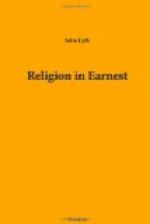was simple and earnest, zealous without passion, and
often particularized in the devotions of the family
the special cases of its individual members. Her’s
was the cry of a child to its father, the appeal for
help, that felt confident of success. Her prayers,
which were offered continually, day and night, might
truly be said to be mighty; and her children, even
when distant from her, have often felt conscious that
her intercessions were going up on their behalf.
But they were urged for many,—for all; and
in particular for the prosperity of Zion, and the
ministers of divine truth. The Rev. John Hartley
writes, “I feel that in your mother’s
removal I suffer loss. I have seldom been more
affected than when she told me, on the last occasion
of my seeing her, that not a day passed without her
pleading with God for me. Who am I, I thought,
that this saint of God should thus remember me in
her prayers?” Her zeal in the cause of God was
constant, patient and persevering; not as we sometimes
see, now bursting into a furious blaze, and then dying
away; it burnt with a bright and steady flame,—being
fed by the secret supplies she obtained through constant
communion with God. Although ready for every
good work, and glad to take her share in the mere
machinery of the Christian church, her chief aim was
the salvation of souls. This she never lost sight
of, and generally, when collecting for Missions or
other benevolent objects, availed herself of the opportunity
of warning, exhortation, or prayer. One who frequently
accompanied her on such excursions says, “We
called at every house in the district. Some of
the people were exceedingly poor. At one door
I said, ‘Mrs. Lyth, you will not beg here.’
Her reply was, ’It is my duty to ask them, if
they give us but a penny, it will not lose its reward.’
In another case the people were Roman Catholics; she
at once exhorted them to come direct to Christ, and
not allow the priest to come betwixt them and the
Savior. In a third, where a member of the family
was sick, we went in, and Mrs. Lyth prayed.”
Another writes, “I first became acquainted with
her about 1823, and have always found her the same
consistent character. She assisted me in the formation
of my class in Acomb. Her visits to us were always
welcome and profitable. Her eye was single.
She had light in her own soul, and it shone in every
society in which she was cast. Many a round we
have had together among the villagers, to beseech
them to be reconciled to God. In this work she
went, perhaps, even beyond her strength, that sinners
might be brought into the fold of Christ. She
rejoiced to lend a helping-hand to the seeking soul;
warning the unruly, comforting the feeble-minded,
and encouraging believers to seek after a full devotion
of heart and life to the service of Christ. Her
faithfulness in the administration of reproof was
exemplary; and though naturally of a retiring disposition,
in the defence of truth and the cause of her Master
she became bold and fearless.” Her ready




